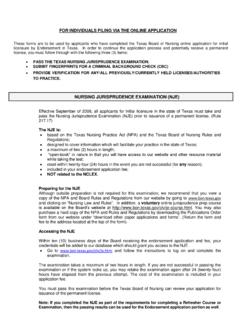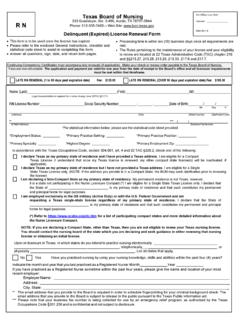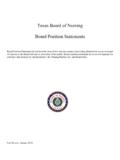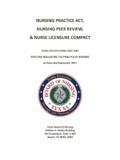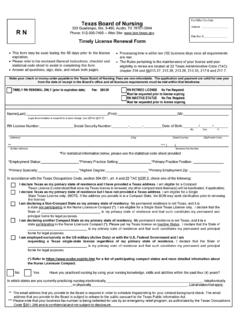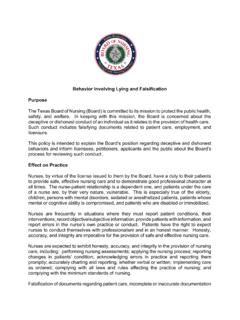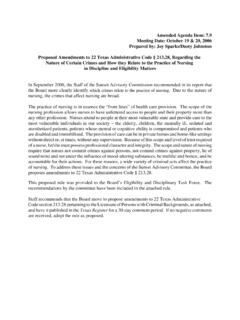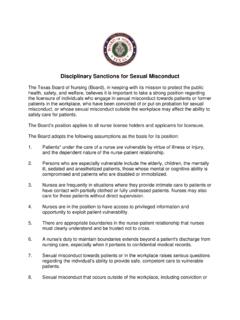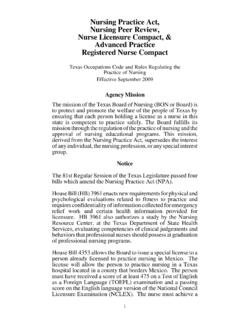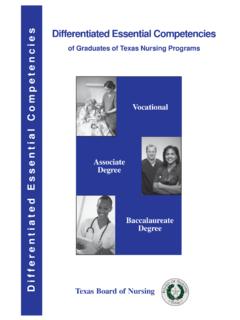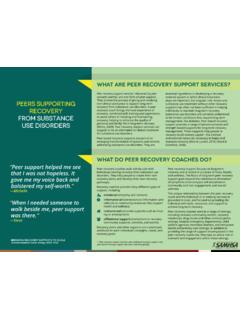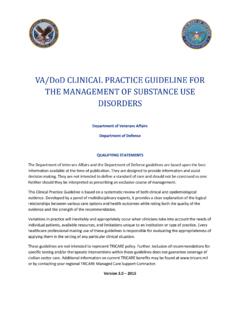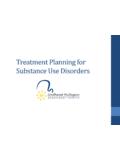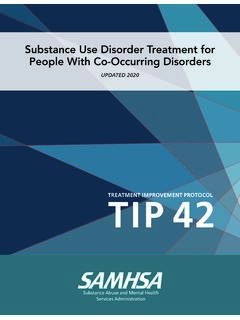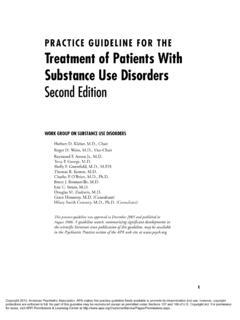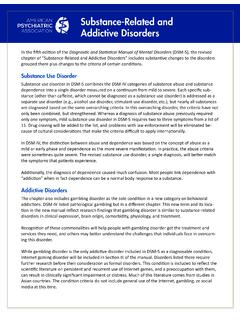Transcription of Substance Use Disorders and Other Alcohol and Drug …
1 Substance Use Disorders and Other Alcohol and Drug Related ConductPurposeThe Texas Board of Nursing (Board) is committed to its mission to protect the public health,safety, and welfare. In keeping with this mission, the Board is concerned about conductthat may prevent an individual from practicing nursing with reasonable skill and safety dueto a Substance use disorder or Other Alcohol and drug related conduct, such as thepossession, intemperate use, misuse, or abuse of Alcohol or drugs, prescribed or policy is intended to explain the Board s position regarding Substance use disorders1and Alcohol and drug related conduct and inform licensees, petitioners, applicants and thepublic about the Board s process for reviewing such on PracticeNurses, by virtue of the license issued to them by the Board, have a duty to their patientsto provide safe, effective nursing care and to be fit to practice at all times. The nurse-patient relationship is a dependent one, and patients under the care of a nurse are, by theirvery nature, vulnerable.
2 This is particularly true of the elderly, children, persons with mentaldisorders, sedated or anesthetized patients, patients whose mental or cognitive ability iscompromised, and patients who are disabled or immobilized. It is incumbent upon the nurseto ensure that he/she is able to provide safe and effective nursing care to these vulnerablepopulations at all times. Nurses who have a Substance use disorder may exhibit impairment in both cognitive andmotor functioning. A nurse affected by a Substance use disorder may be unable toaccurately assess patients, make appropriate judgments, or intervene in a timely andappropriate manner. This danger may be heightened when a nurse works in an The Diagnostic and Statistical Manual of Mental Disorders (DSM) was amended May 2013. The1amended version, the DSM-V, utilizes the term Substance use disorder. The use of the term Substance use disorderin this policy reflects the terminology utilized in the amended version of the manual.
3 Under the DSM-V, a substanceuse disorder may be mild, moderate, or severe. Further, the term may include matters that were formerlycategorized as drug or Alcohol abuse or misuse or chemical setting, like home health, where Other healthcare providers are not present toprovide interventions for the , a nurse need not have a diagnosed Substance use disorder in order for patientcare to be affected. Other Alcohol and drug related conduct, such as the intemperate use,misuse, or abuse of Alcohol or drugs, prescribed or otherwise, may affect a nurse s abilityto provide safe and effective nursing care. This may include behavior that occurs while anurse is not on duty or subject to call. For example, a nurse s criminal history may raisequestions about his/her ability to practice nursing safely. Arrests or convictions for drug oralcohol related crimes, such as Driving While Intoxicated or Possession of a ControlledSubstance, are relevant when determining if a nurse possess current fitness to practice.
4 Theft of drugs or Other substances by a nurse may also cause concerns about the potentialfor impaired nursing nurse may also exhibit impaired behavior while on duty, with or without a confirmingemployer drug screen. In some instances, a nurse may produce a pre-employment drugscreen that results positive for a prohibited Substance . A nurse may also demonstrate apattern of mishandling controlled substances, such as excessive withdrawals of drugs froma computerized dispensing machine (such as a pyxis), failing to properly waste drugs, orfailing to properly document the administration of drugs in medical records. A nurse mayalso have a physical condition that requires the use of prescription drugs. Although the useof prescription drugs is authorized by law and may be necessary, the nurse s ability tofunction safely while under the effects of the drugs will be carefully considered by the Boardif it affects the practice of nursing. This is particularly true in situations where a nurse maybe abusing his/her prescription drugs or has been unable to stabilize the synergistic effectof his/her medications.
5 In any of these situations, the Board's primary goal is to ensure thedelivery of safe and effective nursing any of these situations may affect the ability of a nurse to safely perform his/herduties, these examples are not exhaustive. The Board is authorized to, and does,investigate any situation that may affect a nurse s ability to provide safe and effectivenursing ActionNot all complaints involving a nurse s ability to practice safely will require the same amountof Board intervention or will result in a disciplinary action. The particular facts of each casemust be carefully considered. The Board believes that Substance use Disorders aretreatable conditions, and nurses who achieve stable recovery may be able to safely providecare to patients under certain conditions. Likewise, the Board also believes that nurseswho have engaged in behaviors involving the intemperate use, misuse, or abuse of alcoholor drugs may also be able to safely provide care to patients under certain conditions.
6 In all situations involving an individual's fitness to practice, the Board's primary objective isto ensure the protection of the public. However, the Board will consider the unique factsand circumstances of each situation and may utilize various options in resolving the matter,including returning nurses to practice under structured nurse whose fitness to practice is in question due to a Substance use disorder or drug oralcohol related behavior may be required to undergo an evaluation that meets therequirements of Tex. Occ. Code and Board Rule Under the authorityof Tex. Occ. Code , the Board may require an individual to submit to a physicaland/or psychological evaluation to determine if the individual is able to safely providenursing care. Board Rule and the Board s adopted Guidelines for Physical andPsychological Evaluations contain additional information regarding the types of evaluationsthat may be required in a particular situation and the applicable requirements thatevaluators must meet.
7 The Board will consider the individualized results of the evaluation,along with the facts of the case in determining the most appropriate resolution for theparticular more serious cases, it may be necessary for the Board to deny licensure or remove anurse from nursing practice until the nurse is deemed safe to return to those duties. Inthese situations, the nurse will be given the opportunity to seek treatment and may returnto nursing care when he/she is able to provide evidence of sustained sobriety and stablerecovery. Verifiable evidence of sobriety may include random drug screens, letters ofrecommendation, evaluations from present and past employers, and signed logs of supportgroup attendance. If an individual meets these requirements and returns to nursingpractice, the individual may be subject to Board monitoring and random drug screening fora period of time. In Other cases, it may be determined that an individual s participation in a Board-approvedpeer assistance program will sufficiently minimize the risk to patients/clients and the public.
8 2 Under certain conditions, this may even be accomplished through a confidential, non-publicBoard order. See Tex. Occ. Code (d). 3 There may also be situations where anindividual s behavior warrants an eligibility or disciplinary order that includes random drugscreening and monitored practice for a minimal period of time. These types of orders maybe appropriate when an individual does not have a Substance use disorder diagnosis, buthas engaged in behaviors involving Alcohol or drugs that raises questions about theindividuals' ability to safely practice nursing. If an individual's conduct involves a criminaloffense, the Board will utilize its adopted Disciplinary Guidelines for Criminal Conduct andTex. Occ. Code Chapter 53, in addition to the principles outlined in tthis policy, whenevaluating the individual's behavior. Matters involving an individual's fitness to practice are varied, and each case must beevaluated on its own merits and in light of the risk the individual's practice may pose to An individual must meet eligibility criteria for participation in a peer assistance program.
9 For2example, an individual may not be eligible to participate if he/she is on criminal probation or communitysupervision; has prior Board discipline; or has previously participated in the program. Further, anindividual must be willing to participate in a peer assistance program and such participation is availablethrough an agreed order only. In September 2013, the Board was granted the authority to issue confidential, non-public orders for 3participation in a Board-approved peer assistance program. Such orders may remain confidential so long as theindividual complies with, and successfully completes, the terms of the and the public. For additional information, please review the NursingPractice Act (NPA), Tex. Occ. Code Chapter 301, the Board s rules, located at 22 TexasAdministrative Code Chapters 211 - 227, including - , and the Board sadopted policies located on the Board s web site, at The Board sadopted Disciplinary Matrix may also contain additional information that may be applicablein certain situations involving a nurse s Substance use disorder or Alcohol or drug July 23, 2015
